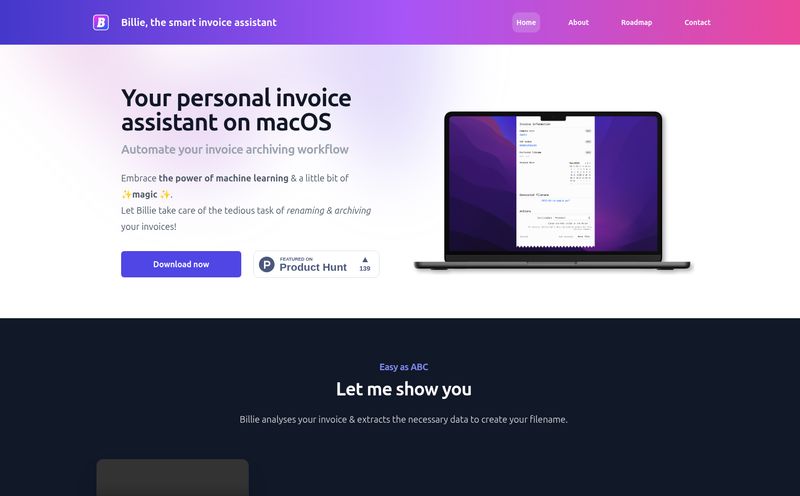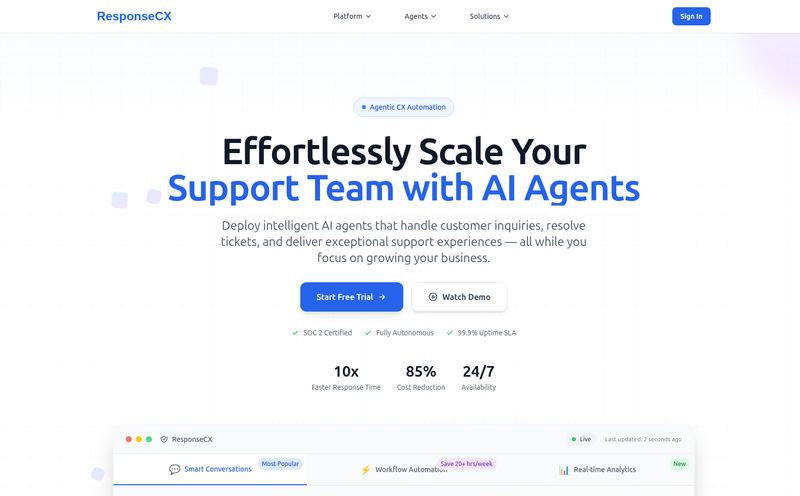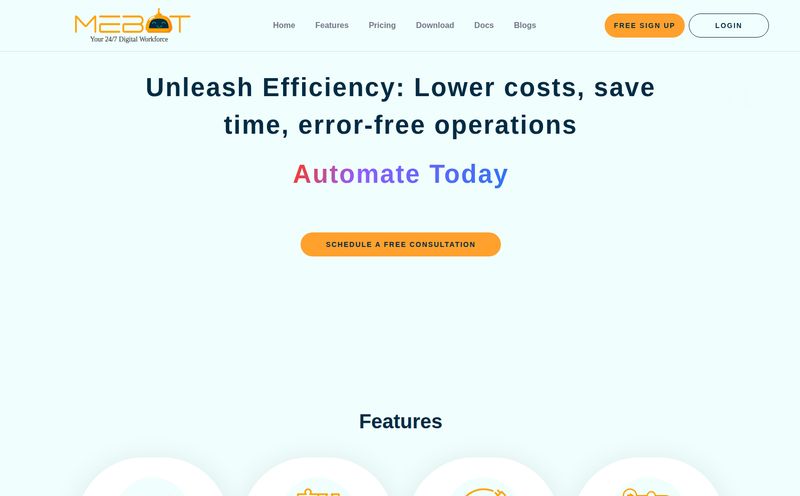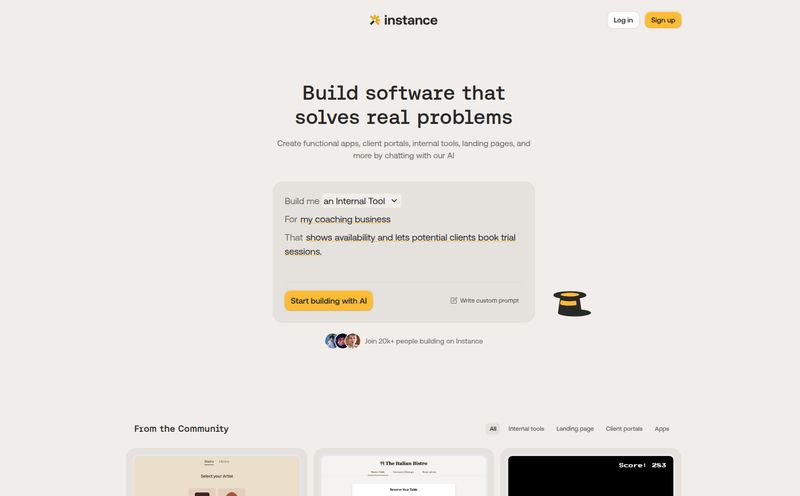If I had a nickel for every time a software company promised to “revolutionize” my workflow, I’d have… well, a lot of nickels. The world of business software, especially CRMs, is crowded. It’s a battlefield of legacy giants like Salesforce and user-friendly darlings like HubSpot, each with its own army of devoted fans and frustrated users.
For years, the choice has been a frustrating one: either you bend your business processes to fit an off-the-shelf CRM, or you spend a fortune on developers to build something custom. I’ve been on both sides of that fence, and neither is particularly green. I still have flashbacks to a weekend spent trying to hack a custom field into an old CRM. It involved three different plugins and an amount of coffee that was, frankly, irresponsible.
So when I heard about Simbla, my ears perked up. The pitch? An AI-generated, no-code CRM platform. You don’t code it. You don’t wrestle with it. You… talk to it. You tell an AI what you need, and it builds a tailored CRM for you.
Sounds a bit like science fiction, right? That was my first thought too. But as someone who's spent years in the SEO and traffic generation trenches, I know that the right tool can be the difference between growth and gridlock. So, I decided to take a closer look. Is this the future, or just another fancy promise?
What Even is Simbla? (And Why Should You Care?)
At its heart, Simbla is a cloud-based platform that does two things really well. First, it’s a no-code application builder. Think of it like a set of super-powered LEGOs for creating web apps, client portals, and database-driven websites without needing to know a lick of code. This alone is pretty cool and puts it in the same ballpark as tools like Bubble or Glide.
But the secret sauce, the thing that makes Simbla stand out, is its AI-Generated CRM. Instead of giving you a blank canvas or a rigid template, Simbla starts by having a conversation. Their AI asks you to describe your business needs, and then it constructs a CRM system specifically for you. It’s like describing your dream house to an architect who also happens to be a super-smart robot that can build the thing instantly.
This flips the traditional CRM model on its head. You’re not just managing contacts; you're building an entire operational hub that’s designed around your business from day one.
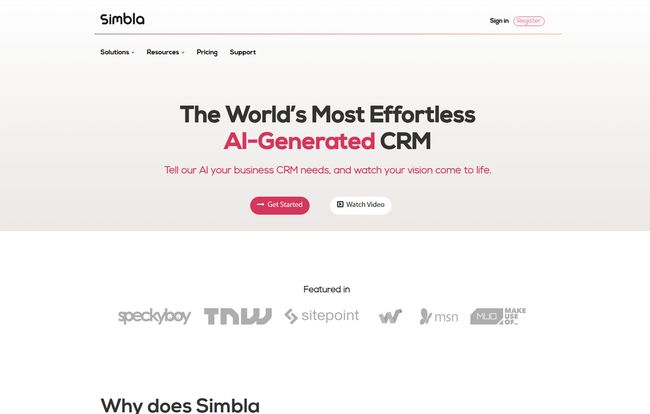
Visit Simbla
The whole idea is to bridge the gap for businesses that find standard CRMs too restrictive but don’t have the resources for a full custom development project. It’s an ambitious goal, for sure.
The Magic Trick: How Simbla's AI Works
Okay, so the “tell the AI what you want” part sounds great on a landing page, but what does it actually mean? Simbla boils it down to a four-step process:
- Tell The AI Your Needs: This is the crucial first step. You provide a detailed description of your business, your processes, the kind of data you need to track, and what you want to achieve. The better your description, the better the result. Garbage in, garbage out, as they say.
- Choose The Design and Layout: The AI isn't just a back-end engineer; it’s also a bit of a designer. It proposes layouts and visual styles for your CRM and client portal. You get to pick what looks and feels right for your brand.
- AI Creates Your Tailored CRM: Here’s where the magic happens. The platform takes your input and generates the database, the user interface, the workflows, and all the interconnected parts of your new system.
- Done! You Can Start: Once it's built, you can jump right in and start using it. Of course, you can still tweak and modify things later using the no-code editor.
I have to admit, there's a part of my brain, the part that's been burned by tech promises before, that remains a little skeptical. But the potential here is huge. Think of the time saved, the development costs avoided. It's a very compelling proposition.
A Look Under the Hood at Simbla's Key Features
Simbla is more than a one-trick pony. The AI generation is the hook, but the platform itself is surprisingly deep. It’s not just a CRM, it’s a whole business operating system.
The AI-Generated CRM Core
This is the main event. We’re talking about building a system for everything from sales pipelines and lead management to project tracking and customer support cases. Because it's tailored to you, you don't have to deal with a bunch of features you'll never use or find workarounds for things that are missing. It’s your workflow, digitized.
More Than Just a CRM: The No-Code Playground
This is what I think makes Simbla particularly powerful. It’s not a closed system. You get a full-blown Website Builder and the ability to create sophisticated Client Portals. Imagine an interior design firm having a portal where clients can log in, see project progress, approve swatches, and view invoices—all seamlessly connected to the main CRM. That’s the kind of thing that used to require a team of developers and months of work. Here, it’s part of the package.
All Your Ducks in a Row: Communication and Automation
A CRM is useless if it's an island. Simbla includes tools to manage communications and, on its higher-tier plans, build out Workflows & Process Automation. This is where you can start automating repetitive tasks, like sending a welcome email to a new lead or assigning a task to a team member when a project reaches a certain stage. This is how you really start to get your time back.
Let's Talk Money: Simbla Pricing Explained
Alright, the all-important question. What’s this going to cost? Simbla isn’t trying to be the cheapest option on the market, and that’s okay. They’re selling a custom solution, and the pricing reflects that.
First off, there’s a 14-day free trial which is generous. It lets you get your hands dirty and see if the AI can really deliver on its promises. I’d highly recommend anyone who's curious to start here.
After the trial, the paid plans kick in. Here's a quick breakdown of their yearly pricing (you save about 20% by paying annually):
| Plan | Price (Yearly) | Key Features |
|---|---|---|
| Basic | $59 /mo | Up to 5 users, 500 client portal users, 10 GB storage, all the core CRM/website/portal features. |
| Pro | $149 /mo | Up to 20 users, 5,000 client portal users, 50 GB storage, adds Workflows. |
| Advanced | $559 /mo | Up to 100 users, 50,000 client portal users, 150 GB storage, Priority support. |
| Enterprise | $1,249 /mo | Unlimited users, massive storage, adds Server-side code for deep customization. |
My take? The pricing is fair for what you're getting. The Pro plan seems like the sweet spot for most growing businesses, as the inclusion of Workflows is a real game-changer for automation. The Basic plan is a solid entry point, but if your business relies on process automation, you’ll want to look at Pro.
The Good, The Bad, and The AI-Generated
No tool is perfect. Let's break down where Simbla shines and where it might stumble.
"The biggest win here is obvious: you don't need to be a code wizard to build something that actually fits your business."
The ability to create a truly bespoke CRM without writing code is a massive advantage. For small businesses that have been making do with spreadsheets or a CRM that just doesn't get them, this could be transformative. The all-in-one environment—CRM, website, client portal—is another huge plus, reducing the number of subscriptions you need to juggle.
On the flip side, let's be real, $59 a month to start isn't pocket change for a brand-new solopreneur. This is an investment. Also, the platform’s success hinges on that initial AI prompt. You need to be able to clearly and accurately describe your business needs. If you’re not sure what you need, the AI might get just as confused. And finally, for the true control-freaks and seasoned developers out there, giving up that line-by-line control might feel a bit strange, though the Enterprise plan does offer server-side code access.
Who is Simbla Actually For?
So, who should be signing up for that free trial right now? In my opinion, Simbla is a fantastic fit for:
- Small to Medium Businesses with Unique Workflows: Think service-based businesses, consultants, small agencies, or anyone who's ever said, "I wish my CRM could just do X."
- Non-Technical Founders: If you're a subject-matter expert but not a tech expert, this gives you the power to build the tools you need yourself.
- Agencies Building Solutions for Clients: An agency could use Simbla to rapidly build and deploy custom portals and management systems for their clients.
It might be a tougher sell for a large enterprise already deeply embedded with a system like Salesforce, or for a startup on a shoestring budget that can get by with free tools for now. But for that significant group in the middle, it’s a very, very intresting option.
Frequently Asked Questions about Simbla
Is Simbla really 100% no-code?
For the vast majority of users, yes. You can build, customize, and manage your entire CRM and web assets using their drag-and-drop visual editor. The only exception is the Enterprise plan, which allows for server-side code for those who need that extra layer of deep customization.
How good is the AI, really? Is it just a gimmick?
It's more than a gimmick. The AI is a powerful starting point. It builds the foundation—the database structure, the initial forms, the relationships between data. It's designed to do about 80% of the heavy lifting. You will likely still need to go in and make small tweaks and adjustments using the no-code editor to get it 100% perfect, but it saves a tremendous amount of setup time.
Can I migrate my existing data from another CRM or a spreadsheet?
Yes, Simbla supports data importation. As with any data migration, you'll want to make sure your data is clean and well-organized before you import it to ensure a smooth transition into your new custom-built database.
What happens if my business needs change? Can I modify the CRM later?
Absolutely. That’s a key part of the platform. Your business isn't static, and your CRM shouldn't be either. You can use the no-code editor at any time to add new fields, create new tables, change layouts, and build new automation workflows as your business grows and evolves.
Is it secure? What about data privacy?
Simbla talks a lot about security and permissions. It's a cloud-based SaaS platform, so they manage the server security. Within the application, you have advanced permissions management to control exactly who on your team (and which clients in the portal) can see and do what. This is critical for protecting sensitive data.
Final Thoughts on Simbla
So, is Simbla the CRM to end all CRMs? Probably not. No single tool ever is. But is it a genuinely innovative and powerful platform that could save the right business a ton of time, money, and headaches? I think so.
Simbla is taking a bold swing at a problem that has plagued businesses for decades. By merging the conversational power of AI with the accessibility of no-code development, they’ve created something that feels different. It’s a tool that empowers you to build a solution around your business, not the other way around.
If you've ever felt trapped by your current software, or if you have a brilliant idea for a business process but lack the coding skills to build it, you owe it to yourself to give Simbla’s free trial a spin. It might just be the most productive conversation you have all year.
